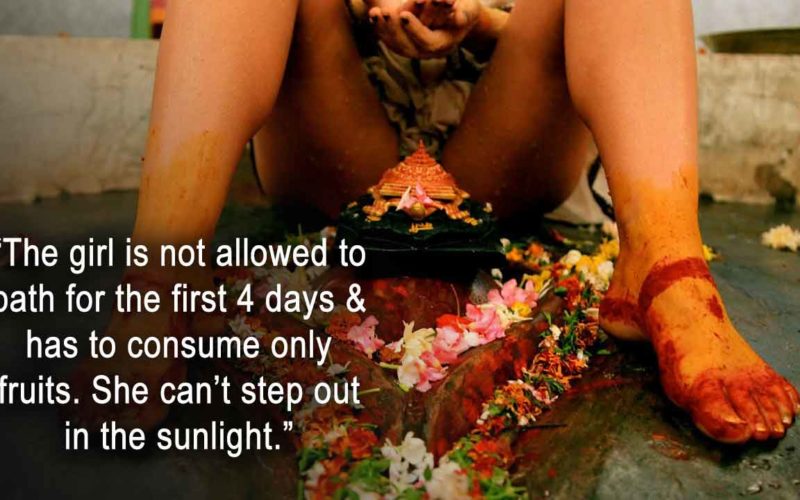- 1.4Kshares
- Share
- Tweet
- Facebook Messenger
Disclaimer: The article cites only a few instances and personal accounts. It is not meant to generalize any community. Reader discretion is advised.
Menstruation or Period is a natural phenomenon which every girl goes through. Yet, somehow, the beginning of the bodily function which marks the transition of a girl to puberty, has been subjected to a lot of regressive customs over the years which continue till today.
In ancient times, when there were no pads or tampons available and women were forced to bleed in the open for five days to a week, rituals were started as a way to give some respite to women so that their weak bodies can get the much-needed rest.

However, slowly as science progressed and proper measures became available, these rituals were made into strict norms which considered girls to be impure when they get their period thereby, losing their essence of caring for the women in the household.
The rituals in several parts of the country mostly focus on discriminating against an already scared, panicked teenager who is kept in isolation just because she is going through a normal bodily function.
1. Karnataka- The neighbourhood women perform Aarti of the young menstruating girl who’s also dressed up. The married women from the neighborhood sing songs in celebration.

The girl is then given a dish prepared from sesame seeds and jaggery called ‘Chigali Unde’, which is believed to help in proper flow. Gifts along with a combination of coconut, betel leaves, etc are offered to the deity in the Puja or are given to the guests.
2. Tamil Nadu- Celebrations in Tamil Nadu are not so subtle as they are in Karnataka. The menstruating girl is celebrated with much pomp and show. The ceremony is called ‘Manjal Neerattu Vizha‘ (turmeric bathing ceremony).

Friends and family are invited and the whole ceremony takes the shape of a mini-marriage where the girl is gifted silk sarees and made to wear a saree or a half-saree.
3. Assam- The ritual in Assam for the young menstruating girl who has had her period for the first time is called ‘Tuloni Biya‘. She is kept in a room separate from other family members and men are not allowed to enter or see her face for four days. Two pairs of beetle nut wrapped in red paper and kept in the neighbour’s place.

Seven married women, who have never been widowed, bathe the girl and she is to pray to the beetle nuts kept earlier in the neighbour’s house. She is decked up in new bridal clothes and jewellery. In ancient times, an astrologer was made to determine whether the girl has committed any sins (dosh) and is made to seek atonement for them.
4. Kerala- For the first three days of menstruation, the girl has to remain in isolation. She is kept in a separate chamber lit by only an oil vessel.

In front of the oil lamp, a bunch of coconut flowers would be placed inside a bronze vessel filled with water. The belief behind this is that the girl would have as many children as there were tender coconuts on the bunch of flowers.
5. West Bengal- Now, this is an encounter narrated to me by a friend who faced this ritual when she got her first period. She belongs to the community of Ghoti bengalis.

Both of them were not allowed to touch any boys during that time, including their own fathers or brothers. On the 7th day, a brahmin comes over to conduct a Puja. He offers the girl a concoction of cow’s urine and stool mixed with milk to eat as prasad, in order to purify her.
Other instances of these rituals are found to be common in a lot of communities where the girl is not allowed to touch homemade pickles or raw papad. She is also required to take care of her own food as no one is allowed to serve her food, not to forget that she is made to sleep in a separate room on a mat on the floor and not allowed to enter the temple or Puja ghar in the house.
Period rituals are a celebration of femininity all over the world and they were made to give women time, to rest their bodies during a vulnerable stage. While many of these rituals are regressive, a change is certainly underway as people have become more aware.
- 1.4Kshares
- Share
- Tweet
- Facebook Messenger




